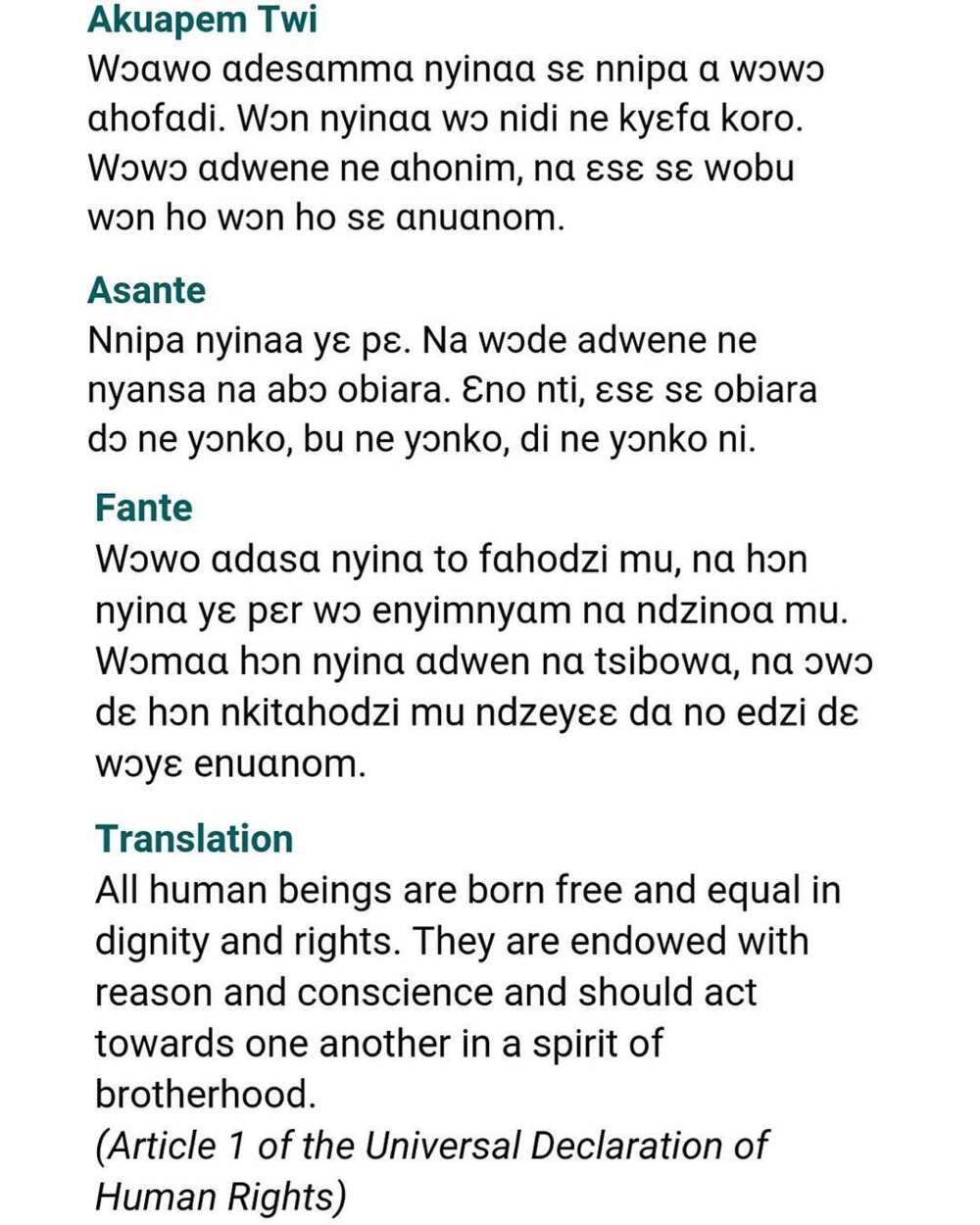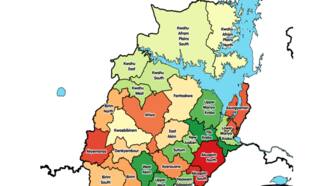Akuapem Twi: basic phrases and interesting facts
The Akuapem Twi is another dialect of the Akan community. Akuapem Twi is one of the most commonly used languages in the Southern region of Ghana. It is one of the local dialects in Akan, which is the most commonly spoken language in Ghana. As a result, learning the basic phrases will come in handy in ensuring that there are no communication barriers, especially for those visiting the southern parts of Ghana.

Source: UGC
What is the difference between Akan and TWI? This is one of the questions that most people conflict on hence it is necessary to make it clear that Akan is a West African language that is spoken mainly in Ghana whereas Twi is one of the local dialects in Akan language. As a result, learning some of the most basic Akuapem Twi phrases will play a major role in the Akan language as a whole since there are some of the phrases which are shared between the other dialects like Fante and Asante Twi.

Read also
Tears flow: Gloria Sarfo breaks down in massive tears at mum's burial; heartbreaking photos pop up
Akuapem Twi translation
These are different types of phrases and their translation to English. Mastering their pronunciation will also make learning the language easier.
READ ALSO: Frafra: basic phrases and interesting facts
Akuapem Twi numbers
This is the translation of numbers from Akuapem Twi to English:
- Baako or Biako or Koro - One
- Ebien- Two
- Abiɛsa - Three
- Anan - Four
- Anum - Five
- Asia - Six
- Ason - Seven
- Awɔtwe - Eight
- Akron - Nine
- Du - Ten
- Aduonu - Twenty
- Aduasa - Thirty
- Aduanan - Forty
- Aduonum - Fifty
- ɔha - One hundred
Akuapem Twi days of the week
These is how the days of the week are pronounced
- Kwasida - Sunday
- Dwoda - Monday
- Benada - Tuesday
- Wukuda - Wednesday
- Yawda - Thursday
- Fida - Friday
- Memeneda - Saturday
Akuapem Twi months of the year

Source: UGC
These are the months of the year in Akuapem Twi:
- ɔpɛpɔn - January
- ogyefuo - February
- ɔbɛnem - March
- oforisuo - April
- kɔtɔnimma - May
- ayɛwohomumɔ - June
- kitawonsa - July
- ɔsannaa - August
- ɛbɔ - September
- ahinime - October
- obubuo - November
- ɔpɛnimma - December
Akuapem Twi translation
Akuapem Twi greetings
These are the different greetings that are exchanged during the different times of the day:
- Maakye - Good morning.
- Yaa ɛna - Good morning to an elderly woman.
- Yaa agya - Good morning to an elderly person.
- Yaa anua - Good morning to someone who is of the same age as yours.
- Maaha - Good afternoon.
- Maadwo - Good evening.
- Da yie - Goodnight.
- Wo ho te sεn? - How are you?
- Mpɔ mu te sεn? - How is life?
- Me ho yε, me da ase- I am fine.
- Me ho yε- My body is fine.
- Me ho yɛ, na wo nsoɛ? - I am fine how about you?
- Afenhyia pa - Merry Christmas.
- Mema wo awoda pa - Happy birthday.
Courtesy words and phrases in Akuapem Twi
Courtesy is another important factor that should be considered while conversing in the local dialect. The tonal variation while pronouncing the words, has so much influence in the intended meaning of a phrase. It, therefore, is vital to take heed of the tonal variation while conversing. These are some of the courtesy phrases that you should equip yourself with while conversing in Akuapem Twi:
- Mepa wo kyɛw, wobɛtumi aka no bio? - Please repeat what you just said.
- Mepa wo kyɛw, wobɛtumi aka no brɛoo? - Could you please slow down in your speed of speaking.
- Mepa wo kyɛ - Excuse me...
- Meda wo ase pa ara - Thank you for your help.
- Meda wo ase - Thank you for everything.
- Medaase - Thank you.
Akuapem Twi phrases for business
If you happen to be in a business set up, these are some of the phrases that you should familiarise yourself with as they are likely to come up during the conversation:
- Eyɛ sɛn? - How much is this?
- Sɛn na wɔka ... wɔ Twi kasa mu? - How do we say...in Twi?
- Woka borɔfo kasa? - Do you speak English?
- Awuraba yi bɛtua biribiara - This lady will pay for everything.
- Aberanteɛ yi bɛtua biribiara - This gentleman will pay for everything.
Other Akuapem Twi phrases

Source: UGC
These are the other Akuapem Twi phrases that one should learn:
- Wotaa ba ha? - Do you come here often?
- Ɛhe na agyananbea no wɔ? - Where is the washroom?
- Woawie? - Have you finished what you were doing?
- Kyerɛ me kwan no - Show me the way.
- Ɛkwan so dwoodwoo! - Have a safe travel.
- Mente aseɛ - I do not understand.
- Mete aseɛ - I can understand you.
- Aane - Yes.
- Ebia - Maybe.
- Daabi - No.
- Mennim - I do not know.
Interesting facts about Akuapem Twi phrases
- Akuapem Twi is one of the Twi dialects in Ghana.
- About 58% of the population in Ghana speak Twi.
- The language is spoken in the Southern parts of Ghana and in the Northern parts of Accra.
- Most of the phrases of this language are shared between the Asante Twi and the Akuapem Twi.
- The tonal variation of the phrases completely changes the meaning of the phrase, hence it is important to mind the tonal variation while speaking.
- Akupaem Twi as the first language that was used when translating the Bible to local dialect.
Akuapem Twi is one of the Ghanaian local dialects that is simple to master. For one to be conversant with the language, they can start by training themselves on some of these Akuapem Twi phrases as they will not only make it simple to learn the language but also play an important role in making conversations clearer.
READ ALSO:
- Fante: basic phrases and interesting facts
- Wasa: basic phrases and interesting facts
- Spoken languages in Ghana
Source: YEN.com.gh




